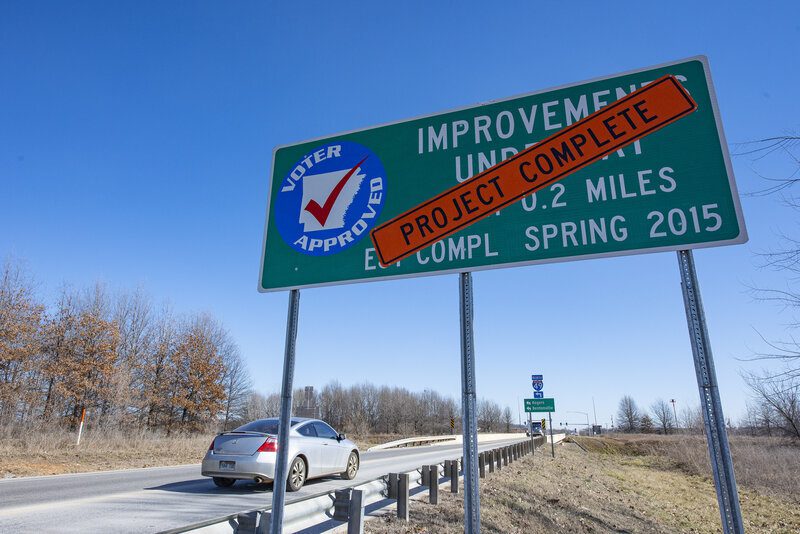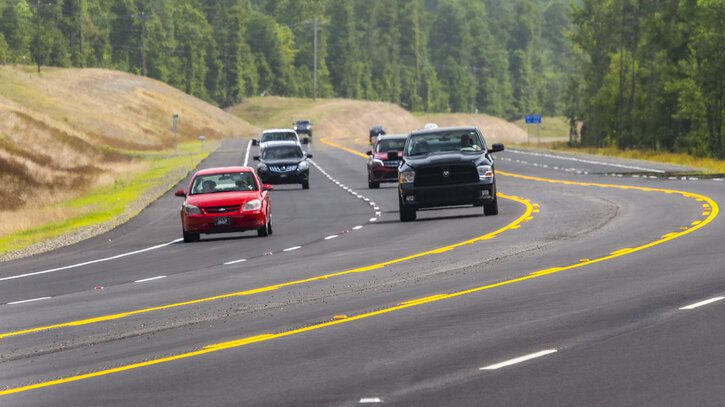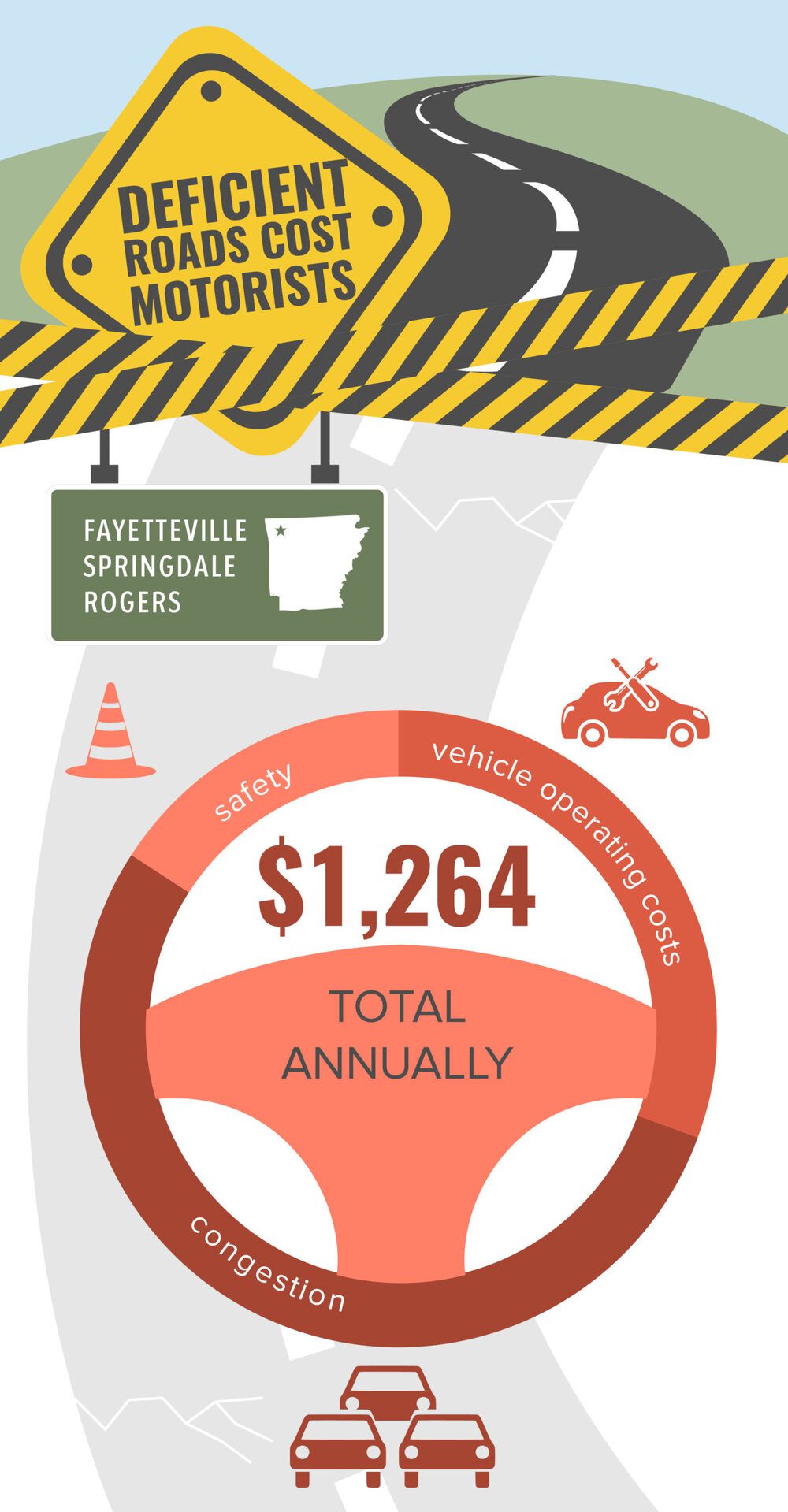Roads and bridges that are deteriorated, congested or lack desirable safety features cost Arkansas motorists $3.2 billion statewide annually — about $1,264 per driver in Northwest Arkansas.
Increased investment in transportation improvements at the local, state and federal levels could relieve traffic congestion, improve roads and bridges, boost safety and support long-term economic growth in Arkansas, according to a new report released today by TRIP, a Washington, D.C.-based transportation research organization.
The report, called “Arkansas Transportation by the Numbers: Meeting the State’s Need for Safe, Smooth and Efficient Mobility,” finds that more than half of major locally and state-maintained roads are in poor or mediocre condition in Arkansas, 5% of locally and state-maintained bridges (20 feet or more in length) are rated poor/structurally deficient, and 2,551 people died on the state’s roads from 2014-2018.
“The findings of the TRIP report confirm why voters’ approval of Issue 1 on Nov. 3 is so important to Northwest Arkansas and our state as a whole,” said Nelson Peacock, president and CEO of the Northwest Arkansas Council. “The Arkansas Department of Transportation made great progress on roadways after voters first approved Issue 1 in 2012, and it’s so important to continue investing in better, safer roads to keep up with the incredible growth our region continues to see.”
Statewide voters on Nov. 3 will be asked to allow a half-cent sales tax to continue being collected to support road construction and maintenance by the Arkansas Department of Transportation as well as counties and cities. The sales tax is set to expire in 2023.
The original funding approved by voters in 2012 led to major improvement of highways, county roads and city streets across the state. Larger Northwest Arkansas cities like Fayetteville, Springdale and Rogers and Benton and Washington counties received funding that allowed them to boost spending on roads by at least $1 million a year.

Funding approved by statewide voters in November 2012 allowed the Arkansas Department of Transportation as well as the state’s cities and counties to make major improvements to roadways. The state over the years has used signs to let drivers know why improvements were possible.
The state Transportation Department used its additional funding to tackle some of Northwest Arkansas biggest transportation needs. It widened Interstate 49 to six lanes from Bentonville to Fayetteville, built the first section of the future U.S. 412 Bypass of Springdale and finished up major sections of the Bella Vista Bypass at the Arkansas-Missouri line.
With Missouri having funded its portion of the Bella Vista Bypass, the roadway will be complete in 2022, making it possible to drive I-49 from Northwest Arkansas to Kansas City without ever leaving the interstate.
TRIP’s report on Arkansas shows the state’s urban roads are becoming increasingly congested, causing significant delays and choking commuting and commerce. TRIP looked at federal information about regional pavement and bridge conditions, traffic congestion, highway safety and cost breakdowns for the urban areas of Northwest Arkansas, Fort Smith, Hot Springs, Jonesboro, Little Rock-North Little Rock- Conway, Pine Bluff and West Memphis.
“These conditions are only going to get worse, increasing the additional costs to motorists, if greater investment is not made available at the federal, state and local levels of government,” said Dave Kearby, TRIP’s executive director. “Without adequate funding, Arkansas’ transportation system will become increasingly deteriorated and congested, hampering economic growth, safety and quality of life.”
Driving on roads in Northwest Arkansas costs the average driver $1,264 per year in the form of extra vehicle operating costs as a result of driving on roads in need of repair, lost time and fuel due to congestion-related delays, and the costs of traffic crashes in which roadway features likely were a contributing factor.
The TRIP report finds that 10% of major locally and state-maintained roads in Northwest Arkansas are in poor condition and 22% are considered mediocre. The report shows 5% of the region’s bridges are rated poor/structurally deficient, with significant deterioration.
Traffic congestion in Northwest Arkansas is worsening, causing 33 annual hours of delay for the average motorist. The state’s 2.1 million drivers lose $780 million annually in time and wasted fuel due to traffic congestion.
Arkansas’ overall traffic fatality rate of 1.41 fatalities per 100 million vehicle miles driven in 2018 was the 12th highest rate in the nation and higher than the national average (1.13 deaths).
Increasingly, companies are looking at the quality of a region’s transportation system when deciding where to re-locate or expand. Regions with congested or poorly maintained roads often see businesses relocate to areas with better transportation systems.
Investing in roadways also creates jobs in Arkansas. The design, construction and maintenance of transportation infrastructure in the state supports approximately 35,000 full-time jobs across all sectors of the state economy. Approximately 594,000 full-time jobs in Arkansas in key industries like tourism, retail sales, agriculture and manufacturing depend on the quality, safety and reliability of the state’s transportation infrastructure network.
Pictured at the top: The Arkansas Department of Transportation used the funding supported by a half-cent sales tax approved by voters in 2012 to make major improvements to the state’s highway system. A new report published today, however, shows the state has a long way to go as deteriorating roads and bridges exist in every region of the state..

























